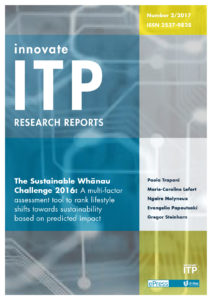 The report presents the results of collaborative research involving the Kaipatiki Project and an interdisciplinary pool of Unitec Institute of Technology researchers. In 2016 the Kaipatiki Project launched the second edition of the Auckland-wide Sustainable Whānau Challenge, an online challenge to spread the adoption of everyday life actions oriented towards a more sustainable lifestyle. The team of organisers had prepared a list of 17 daily actions from which participants could adopt a few for at least three weeks, spreading successes, frustrations, encouragement and suggestions on social networks. The organisers turned to Unitec to have the list of challenges ordered, from the highest to the lowest impact, considering them socially, environmentally and financially. The report presents the creation of a specific multifactorial evaluation tool, and the criteria used to assign a weighted score to the impact of each challenge, along with discussion of the resulting rankings.
The report presents the results of collaborative research involving the Kaipatiki Project and an interdisciplinary pool of Unitec Institute of Technology researchers. In 2016 the Kaipatiki Project launched the second edition of the Auckland-wide Sustainable Whānau Challenge, an online challenge to spread the adoption of everyday life actions oriented towards a more sustainable lifestyle. The team of organisers had prepared a list of 17 daily actions from which participants could adopt a few for at least three weeks, spreading successes, frustrations, encouragement and suggestions on social networks. The organisers turned to Unitec to have the list of challenges ordered, from the highest to the lowest impact, considering them socially, environmentally and financially. The report presents the creation of a specific multifactorial evaluation tool, and the criteria used to assign a weighted score to the impact of each challenge, along with discussion of the resulting rankings.
Click here to read this paper.
Trapani, P., Lefort, M.-C., Molyneux, N., Papoutsaki, E., & Steinhorn, G. (2017). The Sustainable Whānau Challenge 2016: A multi-factor assessment tool to rank lifestyle shifts towards sustainability based on predicted impact. Unitec ePress innovateITP Research Reports(2).
https://doi.org/10.34074/rsrp.itp22017
About the series:
InnovateITP Research Reports (formerly Metro Reports) present research conducted through the Unitec Research Voucher Scheme, which facilitates access by industry and community clients to Unitec research expertise. This research is conducted to client brief, similar to research consultancy. Voucher Scheme projects are published and disseminated according to a recommended, but flexible and adaptable format. In this format there is less emphasis on systematic, comprehensive research justification, elaboration and presentation of findings, but rather an emphasis on research process, narrative and outcomes. Voucher Scheme project reports are intended to be accessible to clients and other research users in ways traditional academic research may not be. All papers are blind reviewed. For more
papers in this series please visit: www.unitec.ac.nz/epress/index.php/category/publications/epress-series/metro-reports/.